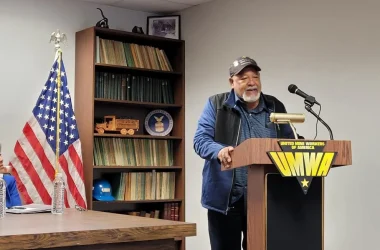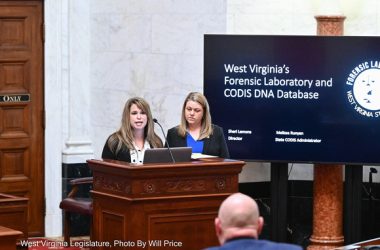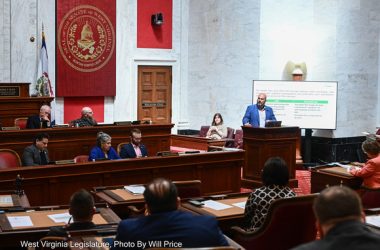By PHIL KABLER
Charleston Gazette-Mail
CHARLESTON, W.Va — Despite claims that the West Virginia Supreme Court has a longstanding practice of providing court-owned furniture and equipment to justices to furnish their home offices, responses to a Freedom of Information Act request Wednesday conclude that no such policy exists.
“A review of our records has not revealed a written policy statement relating to the Court’s practice of establishing home offices for justices,” Court administrative counsel Christopher Morris wrote in response to the FOIA request.
Davis went on to write that she does not agree with statements “that have been made on behalf of the Court about a practice of establishing ‘home offices’ with furniture for justices,” and included memos from Kimberly Ellis, court administrative services director, and Sue Racer-Troy, financial management director, disputing that there is any practice or precedent for justices to take Court property to furnish home offices.
The issue of home offices came to a head last week when, following news accounts, Chief Justice Allen Loughry had court employees remove a leather couch and a circa-1925 antique walnut desk from his house on Scenic Drive, in Charleston.
Both items were moved to a court warehouse in Kanawha City.
The desk is one of the original desks from the opening of the East Wing of the Capitol in 1927. The items are informally referred to as “Cass Gilbert Desks” for the Capitol architect, who also supervised the original furnishing of the Capitol building. The couch had belonged to the late Justice Joe Albright, who died in 2009, nearly four years before Loughry became a justice.
In a statement last week, Supreme Court spokeswoman Jennifer Bundy suggested that it was not improper for Loughry to have court property in his house, stating, “The Court has a longstanding practice of providing for justices an opportunity to establish a home office, with Court-provided technology equipment (i.e., computers) and furniture to suit their respective needs.”
Davis, in her response, confirmed that justices have been provided with court-issued computers and printers for off-campus use, as well as court-issued cellphones.
In her memo, Racer-Troy stated that many court employees are assigned laptops for use at work or home.
“It is my understanding that the justices likely had laptops at their homes, but I was not aware of any other state property that was not kept on the premises,” she stated in the memo, dated Nov. 29. “During the five years that I have worked for the Court, I am not aware of any furniture or fixtures that were purchased with state funds and delivered to the homes of any justices.”
Likewise, in a Nov. 30 memo, Ellis said her research, dating back to 2010, found no precedent of court-owned furniture being provided for use in justices’ residences.
“I did not locate any records documenting that any used furniture items were moved from the Court’s offices or from either of the Court’s warehouses to a justice’s home,” Ellis stated.
“As director, I have not arranged to have new or used furniture or fixtures delivered to a justice’s home,” she added.
However, in a separate response, Justice Menis Ketchum stated in a one-sentence comment, “When I came on the Court in January 2009, I was informed that the Court would provide me a home office.”
Meanwhile, responding to the request for an inventory list of court property assigned to the justices’ home offices, Morris said all justices, except Beth Walker, have court-owned computers.
Loughry and Justice Margaret Workman have desktop computers, valued at approximately $750 each, while Davis and Ketchum have laptop computers, valued at about $1,280 each.
Loughry, Workman and Ketchum also have court-owned printers, while Workman has an office chair at her home, Morris stated.
See more from the Charleston Gazette-Mail





